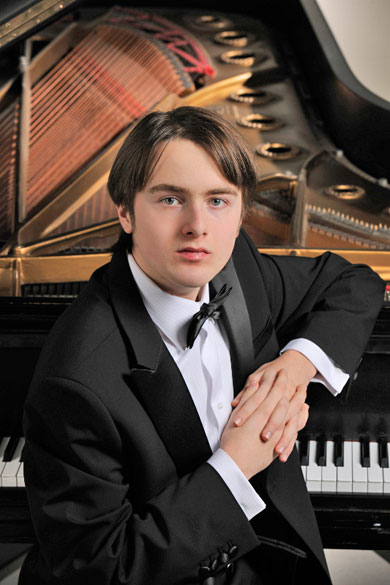Young Russian brings fresh illumination to Tchaikovsky with CSO

“He’s only 21,” said one of the five hundred students in attendance at Wednesday night’s Chicago Symphony Orchestra concert, referring to the evening’s soloist, pianist Daniil Trifonov.
“Scary,” said his companion.
Even by that nation’s long and celebrated standard of piano mastery, it seems we are awash in a wave of extraordinarily gifted Russian keyboard musicians. Nikolai Lugansky had a memorable Chicago Symphony Orchestra debut last season in Rachmaninoff. And Wednesday, his young compatriot, Daniil Trifonov made an equally remarkable bow with the CSO led by Charles Dutoit in Tchaikovsky’s Piano Concerto No. 1.
Looking even younger than his 21 years, Trifonov is having a career-breakout season with debuts with the CSO, Cleveland Orchestra, New York Philharmonic and Boston Symphony, as well as the Vienna Philharmonic and London Symphony. A first-prize winner of the Tchaikovsky and Rubinstein competitions, Trifonov is currently a student of Sergei Babayan at the Cleveland Institute of Music.
Tchaikovsky’s not unfamiliar Piano Concerto in B flat minor may not have been the most adventurous choice but the degree of technical elan and individuality that Trifonov brought to this thrice-familiar work, made it sound newly minted.
Trifonov is clearly a stupendously gifted musician, though his youth was also evident at times. In the first movement he darted ahead of the orchestra more than once, and likewise didn’t pay as close attention to Dutoit and the CSO musicians as he should have in the Andantino.
Still, one will rarely hear this warhorse emerge as fresh and illuminating as in the hands of the young Russian. He brought a lean, leonine power to the virtuosic pages and discovered a distinctive array of expressive nuance throughout with subtle, iridescent coloring and hairpin dynamic turns. The scherzando section of the slow movement was thrown off at striking speed with pinpoint clarity and even articulation.
Trifonov is not a volume player yet he ratcheted up the force and intensity in the final movement with the triumphant concluding octaves delivered with impressive sheen and strength. Dutoit offered close and equally distinctive accompaniment, and—apart from a droopy flute solo—the CSO provided their young colleague with superb support.
For an encore, Trifonov offered Guido Agosti’s arrangement of “Kastchei’s Infernal Dance” from Stravinsky’s ballet, The Firebird. This showpiece piles tortuous complexities and blizzards of notes on top of the familiar music, and Trifonov delivered the glitzy fireworks with fiery panache.
After intermission, Dutoit led a propulsive and dynamic performance of Stravinsky’s Rite of Spring. There was no lack of raw, driving brutality and, under Dutoit, the CSO players put across the violent complex rhythms with daunting volume and individual bravura. Notable particularly was David McGill’s plaintive opening bassoon solo and Cynthia Yeh’s powerhouse bass drum playing.
Yet—perhaps due to the short rehearsal week—this Rite sounded like a work in progress. The slower sections felt a bit streamlined and metrical, with the first part of “The Adoration of the Earth,” wanting in expressive detailing and pagan atmosphere, and missing the unsettling sense of new life unspooling from the muck.
The evening led off with a vivid, sharply colored account of Mussorgsky’s Night on Bald Mountain in the standard Rimsky-Korsakov version (amazingly, not heard downtown in a decade).
It was heartening to see so many students in the audience and to observe them listen so raptly and with such concentration. Some of the Thursday night hackers could learn a lesson in concert deportment from these young people.
The program will be repeated 8 p.m. Thursday and Saturday. There will also be a Beyond the Score presentation of The Rite of Spring 1:30 p.m. Friday and 3 pm. Sunday. cso.org; 312-294-3000.
Posted in Performances



Posted Nov 15, 2012 at 4:39 pm by Dave
I sat next to some students on the terrace, and they were talking at intermission about how exciting it was for them to hear the CSO live and, specifically, legendary players such as Dale Clevenger. His ears must have been burning, since he obliged by laying an egg in the Stravinsky. At least the rest of the orchestra played with its customary confidence and precision. I wonder if any principal player in the CSO’s history has suffered such a complete and shocking deterioration toward the end of their career. I’m sure he’s a wonderful person, and he is still a great musician, but he’s no longer the great horn player he once was. Please exit the stage, yesterday if possible!
Posted Nov 16, 2012 at 4:33 pm by lynne
I have to say, the CSO sounded terrible on the Mussorgsky. The conducting was all over the place and the orchestra could not drive this one home on autopilot. Unison was abysmal, and the tepid applause proved you don’t have to be a chef to know when the broth is spoiled. Having just heard the absolutely divine Philarmonia orchestra under Salonen last week, it gave us pause to wonder if CSO can still be called one of the world’s great orchestras. And yes, the brass was blary in the forte sections and laid quite a few eggs on quiet entrances, and the flutes def had some problems with pitch. Rite of Spring suffered from the same lack of unison as the Mussorgsky and a rushed opening to boot. Very disappointing night.
Posted Nov 16, 2012 at 4:56 pm by Walter Vestal
this was an exciting concert. We are fortunate to live in a city that has an orchestra of such stature. I have been a fan of Dale Clevenger for most of his tenure, but it has been sad to see a great musician not be able to exit gracefully.